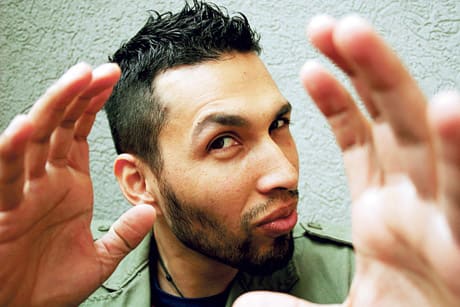Caballo, the alter ego of MC/producer Alberto Caballero, was born in Bogotá, Colombia and recently moved to Canada only two years ago. Originally from a death metal background, Caballo made the leap to ragga MCing a number of years ago. His third album, Global Propaganda, is an extension of a uniquely global drum & bass sound that Caballo's been developing over time. His ragga-heavy, politically charged rhymes travel across borders on the back of dub-y bass lines while bouncing along to Balkan beats and Cumbia riddims. The album ranges from the glitch-y Balkan dub of "La Mision" to the dark dub-step of "Follow Your Heart" to the old school drum & bass flavour of "Times of Fighting"; Global Propaganda is an extension of the sound created by groups like Asian Dub Foundation. As politically intense as the BPMs, Caballo isn't afraid to use music as a tool for social change, professing a clear anti-war, anti-globalization message in his lyrics. Deep, rumbling rhythms interlaced with socially conscious lyrics and a globally-inspired aesthetic make this album a must-hear for drum & bass heads all over the world.
How did the move from Colombia to Canada affect the way you approach your music?
It absolutely changed things for me. Before moving to Canada I lived in the U.S. and it's really different, in terms of the conception of the music itself. Here, it's more global and I can see that Canadian music doesn't follow a lot of trends from the United States or Latin America. Here, you can see a very wide palette, unlike the U.S., where hip-hopers only listen to hip-hop or reggae lovers just dig reggae or hardcore to hardcore. But here you can find everyone loving everything. In Colombia, my music isn't seen as commercial and would never be able to get on the radio or in a magazine. Here in Canada, I have reached a level of recognition that I can respect.
Your music has a clear political message; how has that message evolved since the last album?
Multilateral was against the FARC revolution and all the armed forces in Colombia, while Global Propaganda is more of a warning to what is going on with globalization, repression of women and capitalism versus communism. It's more about telling all the people to rise up.
(Independent)How did the move from Colombia to Canada affect the way you approach your music?
It absolutely changed things for me. Before moving to Canada I lived in the U.S. and it's really different, in terms of the conception of the music itself. Here, it's more global and I can see that Canadian music doesn't follow a lot of trends from the United States or Latin America. Here, you can see a very wide palette, unlike the U.S., where hip-hopers only listen to hip-hop or reggae lovers just dig reggae or hardcore to hardcore. But here you can find everyone loving everything. In Colombia, my music isn't seen as commercial and would never be able to get on the radio or in a magazine. Here in Canada, I have reached a level of recognition that I can respect.
Your music has a clear political message; how has that message evolved since the last album?
Multilateral was against the FARC revolution and all the armed forces in Colombia, while Global Propaganda is more of a warning to what is going on with globalization, repression of women and capitalism versus communism. It's more about telling all the people to rise up.




